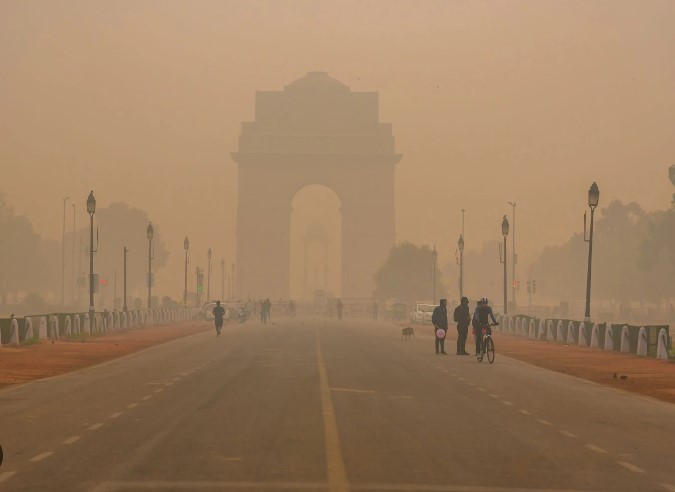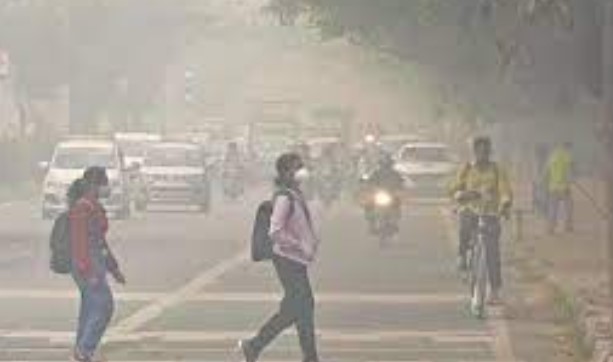
Air Quality Concerns :Delhi Reaches ‘Severe’ Category with AQI at 447; Flight Delays Caused by Fog, Worsening Crisis
Delhi’s air quality plummeted to the ‘severe’ category on December 23, with the Air Quality Index (AQI) reaching 447, as reported by the Central Pollution Control Board (CPCB). At 10:30 am, Anand Vihar recorded a staggering 479 AQI, while Ashok Vihar and Dwarka-Sector 8 reported 454 and 452 AQI, respectively. Other areas, including IGI Airport, ITO Delhi, Jahangirpuri, Narela, RK Puram, Rohini, Shadipur, and Wazirpur, also witnessed severe air quality levels.
The categorization of the AQI follows the standard scale, where an AQI between zero and 50 is considered ‘good,’ 51 to 100 is ‘satisfactory,’ 101 to 200 is ‘moderate,’ 201 to 300 is ‘poor,’ 301 to 400 is ‘very poor,’ 401 to 450 is ‘severe,’ and above 450 is ‘severe-plus.’
Responding to the worsening air quality, the Central government imposed a ban on non-essential construction activities and the operation of BS-III petrol and BS-IV diesel four-wheelers in Delhi-NCR. Unfavorable meteorological conditions, including fog and haze coupled with low wind speed, were identified as the major contributors to the sudden spike in Delhi’s daily average AQI, according to the Commission for Air Quality Management (CAQM). The CAQM, a statutory body responsible for combatting pollution, invoked restrictions under Stage-III of the Graded Response Action Plan (GRAP), enforcing bans on non-essential construction work, stone crushing, and mining in Delhi-NCR. Additionally, Stage-III imposes restrictions on the operation of BS-III petrol and BS-IV diesel four-wheelers in Delhi, Gurugram, Faridabad, Ghaziabad, and Gautam Budh Nagar.
Amid the persistent air quality crisis, the Central government’s directive underscores the severity of the situation, signaling stringent measures to curb pollution. The ban on non-essential construction work and specific vehicular operations aims to mitigate the hazardous conditions prevalent in the Delhi-NCR region.
The Commission for Air Quality Management (CAQM) identified adverse meteorological factors, such as fog and haze, combined with low wind speed, as pivotal contributors to the sudden escalation in Delhi’s AQI. As a statutory body entrusted with formulating strategies to combat pollution, the CAQM invoked Stage-III of the Graded Response Action Plan (GRAP). This stage mandates restrictions on various activities, including construction, stone crushing, and mining, in an effort to contain the escalating pollution levels.

The focus on vehicular emissions is evident in the ban on BS-III petrol and BS-IV diesel four-wheelers, reinforcing the commitment to cleaner air. These measures reflect the government’s urgency to address the immediate threats posed by the deteriorating air quality.
As Delhi grapples with the consequences of severe pollution, the implementation of stringent restrictions becomes imperative to safeguard public health. The government’s intervention serves as a reminder of the collective responsibility to combat environmental challenges and protect the well-being of citizens.
Fog disrupts flights
Flight operations at Delhi’s Indira Gandhi International Airport encountered disruptions on Saturday due to an extensive layer of fog blanketing the national capital, leading to compromised visibility. According to the Flight Information Display System of Delhi Airport, a total of 11 international flights and 5 domestic flights experienced delays in their arrivals and departures. While the impact of the fog on train services remains uncertain, there is currently no official confirmation from the Ministry of Railways regarding delays.
The city witnessed a minimum temperature of 9.6 degrees Celsius, marking a deviation of two notches above the seasonal average, as reported by the India Meteorological Department (IMD). The IMD forecasted the persistence of moderate fog throughout the day, with the maximum temperature anticipated to settle around 23 degrees Celsius.
Despite the challenges posed by the foggy conditions, authorities at Delhi Airport are actively managing the situation to ensure the safety and smooth functioning of flight operations. Passengers are advised to stay informed about the status of their flights and make necessary adjustments to their travel plans.
Fog-related disruptions are a common occurrence during the winter season in northern India, impacting various modes of transportation, including road, rail, and air travel. The dense fog can significantly reduce visibility, leading to delays and cancellations to ensure passenger safety.
Travelers are encouraged to check with airline and railway authorities for real-time updates, and commuters should exercise caution while navigating through the foggy conditions on roads. The concerned agencies are implementing measures to minimize the impact of the fog on transportation services, and passengers are advised to plan their journeys accordingly.
For the latest updates-click here


